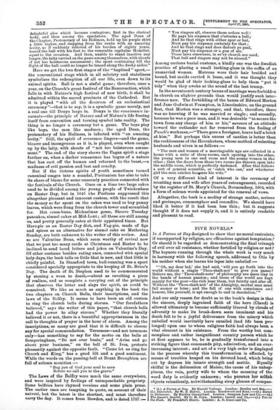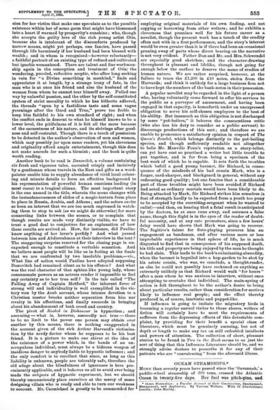FIVE NOVELS.*
Is A Parson at Bay designed to show that no moral restraints, if unsupported by religion, are efficacious against temptation ?
Or should it be regarded as demonstrating the final triumph of evil over all resistance, whether fortified by religion or not?
The keynote running through the whole work is very much in harmony with the following speech, addressed to Otis by his mother when she learns his lapse into unbelief :—
"'Oh, my dear lad,' she had said, will you go forth into the world without a single Thou-shalt-not' to give you pause ? Believe me, the Thou-shalt-nots' of philosophy are mere clay in the hands of human passion; and those of the world are kept mainly for the poor—the rich hear them, but faintly and afar off. Without the 'Thou-shalt-not' of the Almighty, mortal man must fall sooner or later ; and the fall of one with conscience and honour, like yourself, is apt enough to end in desolation.' "
And our only reason for doubt as to the book's design is that the sincere, deeply ingrained faith of the hero (Claud) is allowed ultimately to become sufficiently blurred by clouds of adversity to make its break-down seem imminent and his death felt to be a joyful deliverance from the misery which unbelief would inevitably have entailed (had life been pro- longed) upon one to whom religious faith had always been a vital element in his existence. From the worthy but com- monplace and rather insignificant country parson which he at first appears to be, he is gradually transformed into a striking figure that commands pity, admiration, and an ever-
increasing interest ; and art of a very high order is displayed in the process whereby this transformation is effected, by means of troubles heaped on his devoted head, which bring out by degrees his innate strength and mettle. Equally skilful is the delineation of Maisie, the cause of his un.hap. piness, the vain, pretty wife to whom the meaning of the word duty is evidently unknown ; who pursues her selfish objects relentlessly, notwithstanding stray gleams of compas.
• (I.) 4 Parson at. Bay. By Harold Vallings. London: Bentley and Son.— (2.) Danontch. By W. B. Harris. London: Blackwood and SOLUI.-(3.) Rooted in Dishonour. By Hartley Carmichael. London: Sampson Low and Co.—(4.) The Queen's Scarlet. By G. M. Fenn. London: Cassell and Co.—(5.) Two in
the It By Frankfort Moore. London: A. D. Lines and Co,
sion for her victim that make one speculate as to the possible existence within her of some germ that might have blossomed into a heart if warmed by prosperity's sunshine ; who, though she accepts the guilty love of the rich young artist Otis, because she is intolerant of the discomforts produced by narrow means, might yet perhaps, one fancies, have passed through life harmlessly if her husband had been blessed with wealth ; and in whom is recognised—however reluctantly— a faithful portrait of an existing type of refined and cultivated but ignoble womanhood. There are talent and fine workman- ship again in the conception and treatment of Otis; the wondering, puzzled, reflective sceptic, who after long seeking in vain for "a Divine something in mankind," finds and appreciates it at length, by a strange irony of fate, in the man who is at once his friend and also the husband of the woman from whom he cannot tear himself away. Pulled one way by unlawful passion, and the other by the self-constituted system of strict morality to which he has hitherto adhered, the threads "spun by a fastidious taste and some vague yearnings after the Good and True," prove too feeble to keep him faithful to his own standard of right ; and when the conflict ends in descent to what he himself knows to be a lower level, the pitifulness of it is felt all the more because of the earnestness of his nature, and its strivings after good- ness and self-restraint. Though there is a touch of pessimism to be detected in the author's observation of men and women, which may possibly jar upon some readers, yet his cleverness and originality afford ample entertainment, though this does not make amends for such a blemish ; and the book is quite worth reading.
Another book to be read is Danovitch, a volume containing six fresh and vigorous tales, narrated crisply and incisively by a gentleman whose travels in the East and gifts as a word. painter enable him to supply abundance of vivid local colour- ing and minute details to form an effective background to his representation of powerful human emotions leading (in most cases) to a tragical climax. The most important story is the one named in the title, wherein the scene changes with the instantaneousness of slides of a magic-lantern from place to place in Russia, Arabia, and Athens ; and the actors excite so keen an interest that we are too much engrossed in watch- ing them to stop to ask (as we might do otherwise) for more connecting links between the scenes, or to complain that though results are made very distinctly visible, we have to trust a good deal to conjecture for an explanation of how these results are arrived at. How, for instance, did Pauline know anything of her lover's perfidy ? And what passed between him and Abdurrahman at their interview in the tent ? The staggering surprise reserved for the closing page is un- expected enough to constitute a veritable sensation. And we believe most people will be like us in feeling at the finale that we are confronted by two insoluble problems,—viz., What line of action would Pauline have adopted supposing Danovitch had remained silent as to his offence ? And what was the real character of that sphinx-like young lady, whose consummate powers as an actress render it impossible to feel any certainty as to her true self In the tale called "The Falling Away of Captain Metford," the inherent force of strong will and individuality is well exemplified in the vic- tory won by the Arab servant, whose intense devotion to a Christian master brooks neither separation from him nor rivalry in his affections, and finally succeeds in bringing about his abandonment of both creed and country.
The pivot of Rooted in, Dishonour is hypnotism ; and assuming — what is, however, assuredly not true — there to be no limit to the power one person may obtain over another by this means, there is nothing exaggerated in the account given of the rich Arthur Harvard's victimisa- tion by the needy doctor whom be supposes to be his best friend. It is a picture to make one shiver at the idea of the existence of a power which, in the hands of an un- scrupulous individual, must always be a hideous weapon of insidious danger to anybody liable to hypnotic influence ; and
the only comfort is to recollect that since, as long as this liability is unknown, people are tolerably safe, therefore the old adage about the blissfulness of ignorance is here pre- eminently applicable, and it behoves us all to avoid ever being made the subjects of hypnotic experiment, lest we should thereby unconsciously place ourselves at the mercy of some designing villain who is ready and able to turn our weakness to account. Mr, Carmiclaael is greatly to be commended for employing original materials of his own finding, and not copying or borrowing from other writers ; and he exhibits a cleverness that promises well for his future career as a novelist, though the present work has a touch of the crudity often met with in a first performance, and the story's interest would be even greater than it is if there had been an occasional pruning away of parts whose direct bearing on the narrative is not very evident. Father Dan and Mr. and Mrs. Schwendel are especially good sketches ; and the character-drawing throughout is pleasant and lifelike, though not going far enough below the surface to deserve the name of studies of human nature. We are rather surprised, however, at the failure to trace the £1,200 in £10 notes, stolen from the Harvards; and think it unlikely for a large business firm not to have kept the numbers of the bank-notes in their possession.
A popular novelist may be regarded in the light of a person who, having voluntarily come forward to offer his services to the public as a purveyor of amusement, and having been engaged in that capacity, is henceforth under an unexpressed obligation to serve his self-chosen employers to the best of his ability. But inasmuch as this obligation is not discharged by mere "pot-boilers," it behoves the conscientious critic (who also has his duty to consider as a public servant) to discourage productions of this sort ; and therefore we are unable to pronounce a satisfactory opinion in respect of The Queen's Scarlet, which belongs distinctly to the pot-boiling species, and though sufficiently readable not altogether to belie Mr. Manville Fenn's reputation as a story-teller, can yet have cost so practised a writer but little trouble to put together, and is far from being a specimen of the best work of which he is capable. It sets forth the troubles which befell a good young baronet, Sir Richard, in conse- quence of the misdeeds of his bad cousin Mark, who is a forger, card-sharper, and blackguard in general, without any redeeming good quality ; but one fancies that a considerable part of these troubles might have been avoided if Richard had acted as ordinary mortals would have been likely to do. Being attacked by Mark, Sir Richard strikes him senseless (a feat of strength hardly to be expected from a youth too puny to be accepted by the recruiting-sergeant when he wanted to enlist)—and then, on hearing that a fatal result is anticipated by the doctors, he at once runs away, and assumes a false name, though this flight is in the eyes of the reader of doubt- ful necessity, and at any rate premature, since a few hours' delay would have shown that Mark was going to recover. The fugitive's talent for flute-playing procures him an engagement as bandsman, and after various more or less improbable experiences in that sphere of life, he is much disgusted to find that in consequence of his supposed death, his title and property are being enjoyed by the man he thought he had slain. This leads to the book's culminating absurdity, when the baronet is beguiled into a hop-garden to be shot by his astute cousin, who was, we conclude, a thought-reader, as else he could not possibly have reckoned on anything so extremely unlikely as that Richard would walk "for hours" after a man whom he was anxious to interview, without once attempting to overtake that individual. The main-spring of action is felt throughout to be the author's desire to bring about particular results, rather than consideration for motives likely to influence real people ; and the effect thereby produced is, of course, inartistic and puppet-like.
If influenza is going to imitate the migratory birds in becoming a regular annual visitor to these shores, writers of fiction will certainly have to meet the requirements of sufferers from the depressing effects of this detestable com- plaint, by providing for their benefit a special class of literature, which must be genuinely amusing, but not of depth or length to make any tax on still enfeebled intellects and powers of attention. The collection of short, pleasant stories to be found in Two in the Bush seems to us just the sort of thing that this Influenza Literature should be, and we strongly advise doctors to prescribe it for any of their patients who are " convalescing " from the aforesaid illness.



















































 Previous page
Previous page